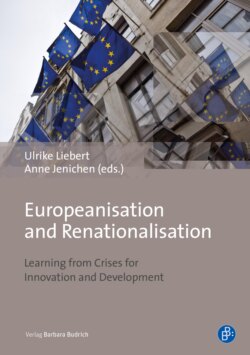Читать книгу Europeanisation and Renationalisation - Группа авторов - Страница 22
На сайте Литреса книга снята с продажи.
6. Conclusion
ОглавлениеIn the end, the Dutch elections of 15 March 2017 underline that Dutch politics tends to become ever more fragmented, with the traditional big parties becoming medium-sized, and the need for no less than four parties to form any majority coalition. This tendency is reinforced by the way in which Wilders has led many of the mainstream parties to define themselves in identity terms, and to disassociate themselves from specific groups in Dutch society. One implication of this combination of political fragmentation and the prominence of identity politics is that building a stable government coalition becomes an ever-greater challenge. This is certainly underlined by the rather drawn out process of government formation that followed the 2017 elections in the Netherlands.
The second implication of the mix of political fragmentation and identity politics, which is of broader significance for European politics at large, is that even if anti-pluralist populist parties do not prevail, this does not mean they go away. On the contrary, anti-pluralist voices remain prominent in Dutch politics and are essentially waiting in the wings for the established parties to fail. This [46] concerns of course above all Geert Wilders’ PVV whose ideal prospect towards the next election might well be a broad-based coalition that leaves him as the main voice of the opposition. However, Wilders is not alone. The Forum voor Democratie is now the second party in parliament that consistently exploits the disillusionment with democratic politics as we know it.
Even if the case of the Netherlands is rather typical and distinct, it thus also raises fundamental questions about the place of anti-pluralist populism across the European continent. The first question is how European democracies can live with the continued presence of anti-pluralist populism in its midst. Although the support for anti-pluralist populists varies from country to country, this is also an urgent question in Italy, France, Germany, Austria, Finland, Hungary, Poland and Denmark. Here it is an open question whether populist parties can effectively be socialized into the pluralistic democratic process or whether, once they are handed the power, they are destined to undermine political pluralism. The only viable strategy here seems to be an empirical one that continuously monitors these parties on their words and actions: those parties that stand strong for pluralist democracy cannot leave unexposed any move to undermine the essentials of pluralist democracy: basic rights for all, a free and open press, the inviolability of the constitution and the rule of law, and no use of physical intimidation. Anti-pluralist parties often enough play by the game, and at times they may even be accommodated within pluralist institutions. However, their continuous presence should not make it possible for them to move the boundaries on the democratic essentials over time.
Continuous vigilance is no guarantee that anti-pluralist parties will not, sometimes, in some countries, get the upper hand, as they already have in Hungary and Poland. That raises the fundamental question what other European states can and should do when this happens (cf. Closa and Kochenov 2016). We cannot claim the right to interfere directly in domestic democratic process. However, it is hard to escape the impression that individual EU states, as well as the EU as a whole, have so far been rather unsuccessful in responding to the developments in Hungary and Poland. In any case, if countries are sliding into anti-pluralism, any turn-around eventually will have to come from within these countries themselves. Hence, an approach that focusses on compliance and insistence on the normative correctness of the European majority is likely to be unproductive. Instead, European responses are best guided by the question what is likely to be most helpful for pluralist movements in the countries concerned to facilitate their return to ascendancy.
In any case, events over the last few years have removed any illusions that the future of Europe will be decided in Brussels. Instead the fate of Europe will be decided in the member states. That is why national elections, and referendums, are of key importance. Europe cannot save individual states – that is something that they can only do themselves. Still, the Europe that is built on societal pluralism and international diversity should not become hostage to the [47] courses adopted by individual member states. Hence, rather than responding to anti-pluralist movements in this or the other country, governments committed to pluralism and diversity are well-advised to form a European core that gathers around a positive agenda in which the basic values of pluralism, freedom and diversity are underlined and actively strengthened.
